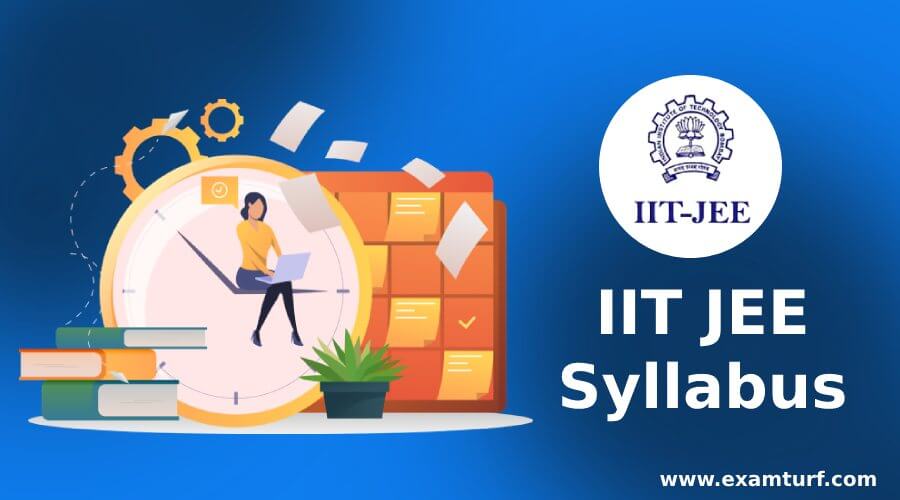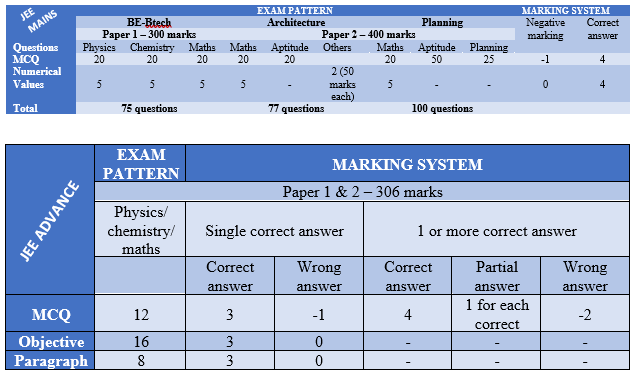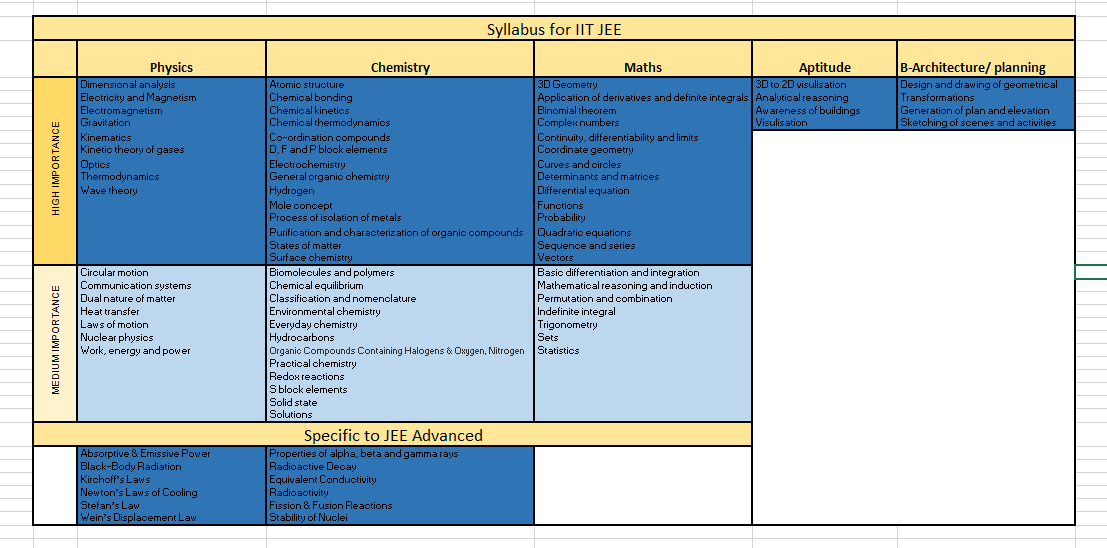
Introduction To IIT JEE Syllabus
The following article provides an outline for IIT JEE Syllabus. JEE (Joint Entrance Examination) is a national-level engineering entrance exam conducted for those students who are ambitious to study in the topmost institute in India. It is one of the toughest exams in India and this exam makes a path for students to join the most prestigious colleges in India and including all the IITs, NITs, IIITs, and GFTIs. These institutes have the highest value in India and also across the world and thus most of the students strive over the years to get admission into it.
Table of contents
JEE has 2 exams; Mains and Advance.
- NTA (National Testing Agency) conducts JEE Mains
- IIT (Indian Institute of Technology) conducts JEE in Advance
First, students need to crack JEE Main and the top 2,45,000 will have eligibility to enter JEE advanced. Upon cracking JEE, students will have an opportunity to pursue B.tech (Engineering) or B.Arch(Architecture and planning). Usually, people think that the students who have a good memory, intelligence, and strong grasping power will pass the exam, but in reality, the students who show good discipline, strong mindset, preparation and execution of well-structured plans along with proper intelligence, grasping power and memory will have an edge to get into these institutions. This article gives the top 10 best tips and tricks to crack JEE.
The following table gives the structure of JEE and the seats available in colleges.

Best Tips For 2021 IIT JEE Syllabus
Given below are the best tips for the 2021 IIT JEE Syllabus:
1. Exam Pattern
The best thing for a candidate is to first study the exam pattern and then the syllabus. The syllabus is very vast, hard to understand contents, and time-consuming. Studying the exam pattern and analyzing the time required is most important.
The following table gives an overview of the exam pattern for the 2021 JEE syllabus.

2. Syllabus Management
Planning of the syllabus and execution is next the phase in preparation for JEE. This is a continuous process and thus requires discipline in completing them. In the beginning, make sure to understand the basic concepts and improve your analytical skills. Preparing self-handwritten notes is essential and it gives a good touch to the topics.
The following table gives the overview of the syllabus for JEE and the detailed syllabus will be available on the official website.

3. Study Materials
The best material to refer to is the self-handwritten notes but to create that, students need to refer to multiple sources, read, digest, and write them. Having 1-2 good books for each subject would be sufficient and better not to follow more than 2 since it takes much time to understand their pattern and most of the time will end up reading the same material again.
Some of the best books are as follows:
- NCERT (Physics, chemistry, and maths)
- H C Verma (Physics)
- Irodov (Physics)
- Krotov (Physics)
- R D Sharma (Maths)
- Prabhat Kumar (Physical chemistry)
- Jagadamba Singh (Organic chemistry)
- K Rama Rao (Inorganic chemistry)
- Top coaching institutes study materials (FIITJEE, ALLEN, etc)
- A self-study guide for B.Arch by PK Mishra (Architecture)
- JEE mains guide by R Gupta (Architecture)
4. Solving Question Papers
This is the most important point of all and creates a huge difference for the candidates entering into JEE. Repetitive solving of previous year’s papers will give an overview and get acquainted with the question paper pattern, time management, and selection of questions.
5. Self-Analyzing through Mock Tests
Preparing for the exam is very much important along with preparing the syllabus. Students need to feel the exam situation and understand their anxiety levels and the best way to experience is to give mock tests. Mock tests help in self-analysis and improve time management. There would be many questions that would be easier to solve but may require more time for solving, in such cases pending them for a later attempt and continuing further will be a smart move. For overcoming these situations, mock tests help in finding the corrective actions to the issues faced.
The official website of NTA and JEE do give mock tests for students to practice and it’s highly advised for students to give periodic mock tests and evaluate honestly.
- Mock test link (Mains): https://nta.ac.in/quiz
- Monk test link (Advance): https://jeeadv.ac.in/mock.php
6. Time Management
Time management needs to be applied in 3 circumstances:
- Preparing the syllabus: Completing the notes well within time gives a chance for getting multiple revisions.
- Studying the syllabus: Allotting the time for each subject/topic every day and completing the set syllabus gives more confidence.
- In the exam hall: Avoiding the questions which take more time in the beginning and focusing on questions that are easy to solve gives a smart move in the examination. Avoid getting stuck in 1 question and unnecessary steps while solving will give you more time to complete the paper.
7. Avoiding the Distractions
Having a strong mindset to motivate yourself will be often required by the students. There would be many times when distractions will occur, and bringing the mind back to discipline is very important. Internet, smartphones, group studies, and YouTube for study purposes need to be avoided until it’s required. These sources do offer some knowledge but also take precious time and the chances of timetable getting distracted are very high.
8. Revision, Revision, Revision
A good number of revisions helps to get better ranks in JEE. It helps in boosting confidence and improves time management, and memory power.
9. Avoiding Negative Environment
The times do come when mock test scores are less, overthinking too much about the result, and worrying too much about the future. These would cause extra pressure on the routine than giving a solution, so the best way is to avoid them.
10. JEE is Not the End
This exam does provide grand entry to top institutes, but unfortunately, only 50,000 odd seats are present and thus it’s not possible for every smart student gets the chance to study there. This is just one phase of life that may lead to success or failure. Success adds as an achievement and failure adds as the best learning experience. Taking the discipline from the efforts put in JEE will help in succeeding in the future than regretting the result and will make the mind more matured and capable to withstand more failures.
Conclusion
These are some of the best tips and tricks for students to prepare for the JEE. Periodic checking for notifications on official websites is highly recommended for changed syllabus, new patterns if added, exam dates, etc.
Recommended Articles
This is a guide to IIT JEE Syllabus. Here we discuss the introduction, exam pattern, syllabus management, study materials, and time management, etc. You can also go through our other suggested articles to learn more –
Are you preparing for the entrance exam ?
Join our Exam Preparations test series to get more practice in your preparation
View More